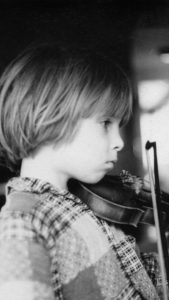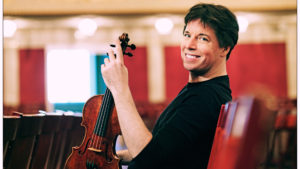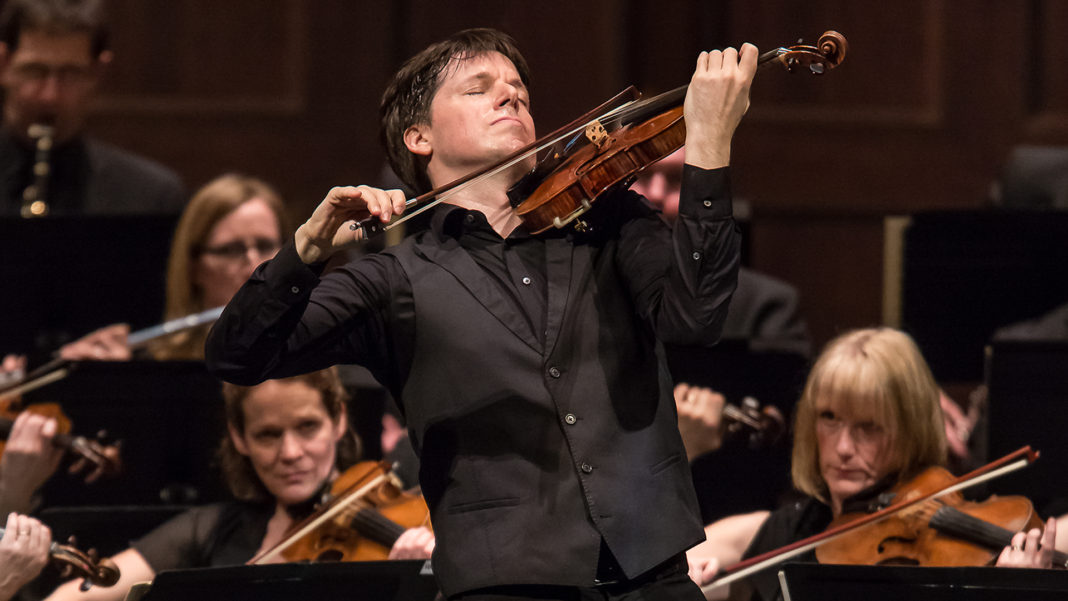Professional debut at 14. Carnegie Hall at 17. Record label deal at 18. Hardly the life of a typical teenager. But such were the early years of violinist Joshua Bell. For over 35 years he has been in the public eye as one of the most popular and highly-acclaimed violinists of our time.
Bell is currently on a four-stop California tour with Italian pianist Alessio Bax. They begin their performances Wednesday night at Walt Disney Concert Hall before moving on to performances in Palo Alto, Davis and Oxnard.
On the cusp of turning 52 in December (and still holding to the fact he’s 51 for now), Bell is touring, he is the Music Director of the Academy of St. Martins in the Fields and he is also a father of three boys. This seemed like a perfect time to look back on his childhood, how someone like 18-year-old violinist Daniel Lozakovich can navigate similar territory as Bell did and when, if ever, Bell can have done it all.
You said in an interview on Violin Channel that if you could go back in time you would have practiced harder during your teenage years.
How challenging was it for you to balance being a teenager with being a musician?

I had a slightly unusual sort of teenager years. From the age of 12 I started getting really into music and studying at university. All of my closest friends were much older than I was. I went through the motions in high school, but I wasn’t really well understood there.
I can’t say I had a normal upbringing. I graduated high school at 16 and moved out of the house. I was young to be living on my own at 16, but I was close to my family – just ten minutes away – and I could bring laundry over.
As far as balancing things, I was into tennis and basketball. I was totally addicted to video games. I did waste a lot of hours when I was 13-16. My mother would drop me off at music school and I would sneak out the back and go to the video arcade. I had my name on a lot of the games with the high score. I was a perfectionist and always wanted to do better. I did a lot of fun activities. Maybe that’s why I still love what I’m doing and I never got burned out and had that big crisis that others had.
I recently saw Daniel Lozakovich play with the LA Philharmonic the Tchaikovsky Violin Concerto. He earned so much applause at the end of the first movement…
If there is no applause after the 1st movement, there’s a problem. The first movement is an entity in itself. It ends so bombastically it seems ridiculous not to clap.
…Esa-Pekka Salonen was conducting and had to tell the audience there was more to come. But what I’m wondering is how do you handle that kind of attention and not let it overcome you, particularly now in the social media age?

If you are really sensitive, and we all are as musicians because you are baring your soul on stage – or at least you should be. Today people are brutal and cruel online. They hide behind their computers. It’s really a phenomenon that is so destructive. For me it is difficult. I try to avoid looking at social media places where people can be mean.
For a young person it might be more difficult. But you have to have good influences around you that balance the right amount of praise with the right amount of constructive criticism.
When did you as a performer realize you had moved from knowing how to play a piece to knowing why you were playing a piece? In other words, where your level of maturity caught up to the work of the composer?
There’s no beginning or end to that. It’s a constant process. There’s never knowing a piece. Maybe because of my teachers, particularly Josef Gingold, it was never just about playing the piece, it was always about getting to the emotional content of the piece. It’s always cute when I talk to very young kids and I say, “Have you done the Bruch concerto?” And they respond, “Oh I’ve done that.” As if they’ve learned it, but they haven’t quite understood that this is an ongoing process. It’s a constant evolution about how you think about a piece. That’s why we play classical music, because it presents endless challenges. It’s never boring. You can always find new ways and it strikes you in different ways each time.
You’ve spent time lately playing more chamber music as you will this week with Alessio Bax. How do these concerts challenge you in ways being a soloist with an orchestra does not?
Going in and playing Mendelssohn is enjoyable, but you are there for 30 minutes and you leave. You usually have one or two rehearsals with the orchestra, but it doesn’t allow for the level of depth of rehearsal that chamber music does. I love that I can work hour and hours exploring the music and going on a tour and performing night after night. Each time we work to see what we can improve.
Violinist Jascha Heifetz said, “There is no top. There are always further heights to reach.” What further heights do you want to reach?
Of course he’s right. I’ve never heard that quote from him. If there was a top, he was pretty close. For me it is just as personal. For me it is expanding my repertoire. I would like to get into doing more composing. I write all my own cadenzas for the major violin concertos and I’ve been doing arrangements. I’m kind of a wannabe composer and that’s what I want to explore in the next decades. Life is a little bit too short or a lot too short that we can’t do all the things we want. That’s something, as I am getting older, I’m more aware of than when I was younger. I won’t get to do everything I want to do.
Main photo of Joshua Bell by David Bazemore
All photos courtesy of Joshua Bell










